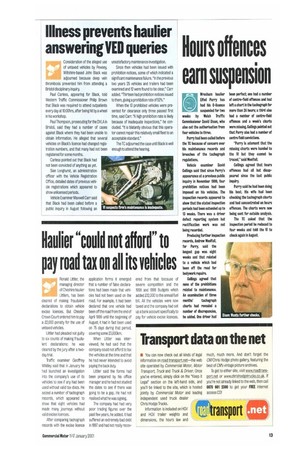Haulier "could not afford" to pay road tax on all its vehicles
Page 15

If you've noticed an error in this article please click here to report it so we can fix it.
Ronald Littler, the managing director of Cheshire haulier Littlers, has been cleared of making fraudulent declarations to obtain vehicle excise licences. But Chester Crown Court ordered him to pay a 22,000 penalty for the use of untaxed vehicles.
Littler had pleaded not guilty to six counts of making fraudulent declarations: he was cleared by the jury after a twoday trial.
Traffic examiner Geoffrey Whitley said that in January he had launched an investigation into the company's use of its vehicles to see if any had been used without valid tax discs. He seized a number of tachograph records, which appeared to show that eight vehicles had made many journeys without valid excise licences.
After comparing tachograph records with the excise licence application forms it emerged that a number of false declarations had been made that vehicles had not been used on the road. For example, it had been declared that one vehicle had been off the road from the end of April 1999 until the beginning of August; it had in fact been used on 75 days during that period, covering some 23,600km.
When Littler was interviewed, he had said that the company could not afford to tax the vehicles at the time and that he had never intended to avoid paying the back duty.
Littler said the forms had been prepared by his office manager and he had not studied the dates to see if there was going to be a gap. He had not realised what he was signing.
The company had had very poor trading figures over the past few years, he added. It had suffered an extremely bad debt in 1997 and had not really recov ered from that because of severe competition and the 1998 and 1999 Budgets which added £12,000 to the annual fuel bill. All the vehicles were now taxed and the company had set up a bank account specifically to pay for vehicle excise licences.
































































































